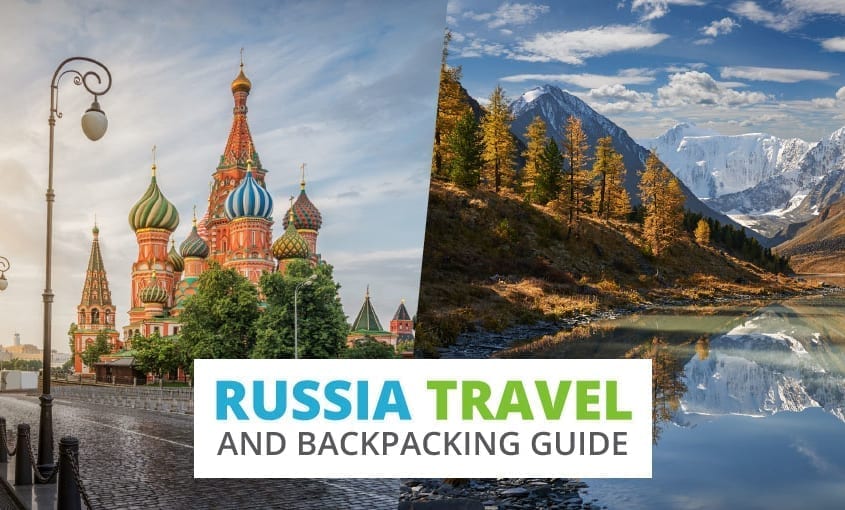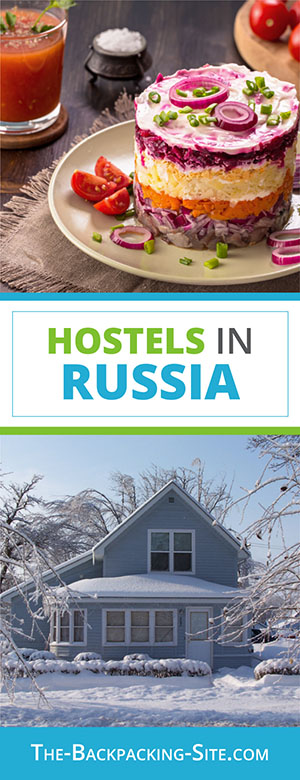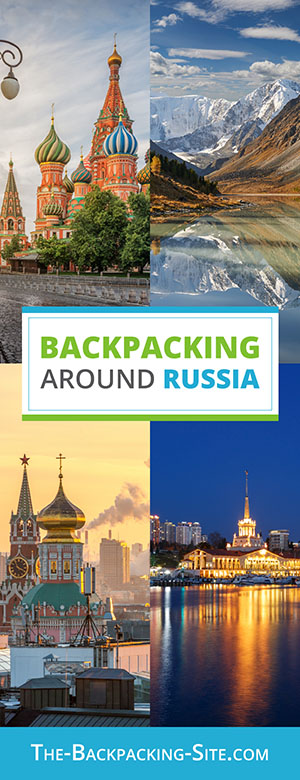
Backpacking Russia
Looking for important travel information while backpacking in Russia? Here you will find information on working in Russia, entry visas, Russia hostels, and much more.
Table of Contents
- Facts About Russia
- Entry Visa Requirements for Russia
- Foreigner Work Permits and Backpacker Jobs in Russia
- Russia Hostels
Facts About Russia
Russia is a transcontinental country composed of parts of Asia and Europe (cumulatively entitled Eurasia) and, as such, is comfortably the largest country in the world with an area of 17,075,400km², and the ninth most populous country in the world, with approximately 142 million citizens.
Its immense size is such that Russia borders countries such as Norway and Finland, but also China, Mongolia and North Korea, and provides easy access to other countries like the United States and Japan.
Churchill once said that ‘Russia is a riddle wrapped in a mystery inside an enigma’ and its history goes a long way to explaining why this image has endured. Originally inhabited by scattered tribes like the Proto-Indo-Europeans and the Scythians, much of the territory’s ancient history was dominated by the presence of warlike bodies of men, most notably the Huns and the Khazars, many of whom would later make their mark in Europe.
Russia’s lineage, on the other hand, starts with the state of Kievan Rus, composed of the Varangians and the Slavs in the region, which became the largest and one of the most prosperous states in Europe in the 10th to 11th centuries AD. Needless to say, this arrangement did not persist due to Turkish incursions, with the Novgorod Republic state and the Vladimir-Suzdal principality rising and falling in turn thereafter.
A measure of stability was only achieved with the Grand Duchy of Moscow (Muscovy), which lasted between 1340 and 1547 and set about uniting much of the territory under its rule as well as leading to the well-known Tsarist era from the 17th century up until the 1917 Revolution.
Russia’s history in the 20th century was dominated by the influence of communism, with the rise of the Bolsheviks and then the Soviet Union. The Great Patriotic War (otherwise known as World War II) and the Cold War, both central to the Soviet Union, were also pivotal in establishing the Russia we know (and frequently misunderstand) today.
Moreover, despite the demise of the USSR in 1991, communism continues to influence Russia’s outlook and state today, although under Vladimir Putin the country has started to recover economically and has also regained a substantial degree of political influence.
Nevertheless, while Moscow and St. Petersburg represent very strong tourist centres, the country as a whole still enjoys a remarkable mystique and certainly makes it one of the most interesting places to visit in the world.
- Population – 142,754,000 (2006 estimate)
- Language – Russian
- Currency – Ruble
- Time Zone – GMT + 4 (in Moscow)
- Phone Code – +7
Climate in Russia
With a distance of approximately 8,000 kilometres between the two most widely separated points in the country, defining Russia’s climate singularly is impossible. The areas of European and Asian Russia generally enjoy a continental climate, but mountainous terrain elsewhere can mean the influence of Arctic and Atlantic climates, while certain areas around the Black Sea can be said to have sub-tropical temperatures during the year.
However, across much of Russia, there are only two distinct seasons – winter and summer – and this Arctic influence has given rise to fears over the harsh conditions during the Russian winter (which put paid to both Napoleon and Hitler during their respective invasions).
The coldest month is typically held to be January, with the warmest being July. As a major tourist centre, Moscow is indicative as to what to expect in Russia but, should you venture elsewhere, be prepared for anything from minor differences to extreme polarities:
Things to do in Russia
Much tourism in Russia, even for backpackers, revolves around Moscow and St. Petersburg. This is understandable, as they have been the two most historically significant cities in the country and, moreover, possess almost all of Russia’s most recognisable landmarks and sights.
Moscow
Starting with Moscow, the immediate attraction for visitors is the incredible Red Square (krasnaya ploschad). Separating the Kremlin (the former royal citadel and current residence of the Russian president) from the merchant quarter of Kitay-gorod, Red Square is the most famous square in the country (and arguably in the world) and all the major streets in the city gravitate towards it. Established in 1493 after the wooden buildings on the territory were cleared by Ivan III, the name itself bears no relation to communism nor to the prevalence of red in the square, but rather to the fact that the Russian krasnaya can be translated as both ‘red’ and ‘beautiful’ and was initially used to refer to nearby St. Basil’s, but was then associated with the square as a whole.
Established as a UNESCO World Heritage site in 1990, Red Square is today considered a landmark in its own right but owes much of its pedigree to the surrounding sights. Prominent in this regard is St. Basil’s Cathedral. A multi-tented church with distinctive onion domes, the Cathedral was built between 1555 and 1561 under the rule of Ivan IV (otherwise known as Ivan The Terrible) to commemorate the capture of Kazan and legend has it that Ivan, true to his personality, had the architect, Postnik Yakovlev, blinded so he wouldn’t be able to build anything that might be more beautiful. Either way, the Cathedral stands today as a symbol of the marriage of Europe and Asia which has made Russia so remarkable.
Adjacent to and overlooking Red Square is the Kremlin complex. The word kremlin is actually defined as a citadel, with Moscow one the most famous, being the historical seat of government. Composed of four palaces, four cathedrals and a series of towers, the Kremlin has been inhabited since the 2nd millennium BC, although the term kremlin was only recorded first in the 14th century. As well as its huge political importance, the Kremlin is also a major tourist attraction today, being home to sights like Cathedral Square, Ivan the Great Bell Tower, the Grand Kremlin Palace and the Kremlin Armory Museum (home to a number of the famous Faberge Eggs).
Other hugely important sights in Moscow include Lenin’s Mausoleum – also part of Red Square and home to the embalmed (and increasingly plastic) body of Lenin – and the incredible Tretyakov Gallery, home to the best in Russian art as well as a whole host of prominent works from European artists, not to mention the world-famous Bolshoi Theatre and the immense Cathedral of Christ the Saviour.
St. Petersburg
Twice the capital of Russia (between 1712-1728 and 1732-1918), St. Petersburg’s significance in history is unquestioned and reflected in its own long list of beautiful landmarks. Of particular note are the many incredible cathedrals, such as the Peter and Paul Cathedral (located inside the Peter and Paul Fortress and the oldest landmark in St. Petersburg, being built between 1703 and 1733), St. Isaac’s Cathedral, and the Church of the Saviour on Blood (referring to the blood of the assassinated Alexander II, wounded in 1881 on the site).
Additionally, St. Petersburg has arguably the greatest selection of cultural repositories in the country, being home to the Summer Palace of Peter the Great, the Russian Museum and, the jewel in its crown, the Hermitage Museum. One of the largest art museums in the world, with approximately 3 million works of art in its coffers displayed across six buildings (the most famous being the Winter Palace), the Hermitage collection was started by Catherine the Great in 1764 and has only expanded since then. Today, the collection is highlighted by the gargantuan selection of Russian artworks, as well as examples of the European greats such as Michelangelo, Leonardo da Vinci, Rembrandt, Picasso, van Gogh and Matisse.
Naturally the above represents but a fraction of what can be found in Russia as a whole but, if culture is your thing, you simply cannot avoid the big two cities. Use them as a base, branch out elsewhere and see what else you can discover.
Tours and activities in Russia
Another good way to get an idea of what to do is to scan the activities offered by Get Your Guide or Viator. They work directly with local tour operators, so you won’t have to scour the internet or roam around town trying to find the best deal.
If you know your schedule ahead of time, a great insider tip is to buy tickets for major tourist attractions ahead of time. Tiqets has entrance tickets and skip the line passes for major attractions in Moscow and Saint Petersburg so that you can avoid the lines and save that precious time for more exploring.
How to Travel Around Russia
Moscow is the main destination for international flights, with the city hosting a large number of airports. The largest of these is Domodedovo International Airport, which is also the busiest airport in Russia and carries flights from London-Heathrow courtesy of British Airways, Transaero and bmi.
The other major airports are Sheremetyevo International Airport, which flies to and from London-Heathrow with Aeroflot, and Vnukovo International Airport. All three of the airports are comfortably outside the city centre though, so make plans for getting there once you arrive.
If you’re flying to Russia or plan to take short flights within the country, we recommend using a few different flight comparison search engines. Kiwi is a new favourite among travellers. On average, we have found the cheapest flights with them compared to the other websites out there.
Of course, it is always worth checking Skyscanner to guarantee you’re getting the best deal. Both websites offer great flexible search options, allowing you to search the whole country of Russia to find the cheapest airport to fly into, and also see prices for a full month if you’re flexible on travel dates.
Travel within Russia
Once inside the country, and particularly in the two major cities, travelling around is relatively easy. The Moscow Metro carries some 12 lines covering 172 stations, making travel across the city fairly convenient, while the Saint Petersburg Metro covers 60 stations across 4 lines.
Travelling around the country, and to other bordering states, is facilitated by the rail service. Russia has links with Finland, China, Azerbaijan, Mongolia, North Korea and many other states, as well as proposed links with Japan, Alaska and Norway. Using these lines is also a fantastic way to see the rest of the country beyond the major tourist destinations.
Driving in Russia
You may also want the flexibility to stop in smaller towns between the major cities. If you decide you want to rent a car in Russia, you can use DiscoverCars to compare offers from the major car rental agencies in the region.
Small Group Adventure Travel
Though part of the fun of backpacking is exploring on your own, there are situations, especially when venturing off the tourist trail, when it does make sense to go with a guide or a small group. For these times, a popular option among backpackers is G Adventures. They hand-select local guides to ensure authenticity and quality. This is especially a good option for those travelling alone who would like to meet up with like-minded travellers. Their most popular trips in Russia are their Classic 12 Day Tour and their Trans-Siberian Railroad tours originating in Moscow.
Health and Safety in Russia
As with travel to all other countries abroad, it is vital that you get travel insurance before you leave. Healthcare in Russia, although slowly improving, remains in a poor way, with the death rate comfortably out-stripping the birth rate every year and public hospitals woefully underfunded.
Therefore, do not expect decent service if you do need to visit one of Russia’s hospitals, even if you happen to be in Moscow or St. Petersburg. However, in terms of entering Russia, there are no medical restrictions.
While staying in the country, avoid tap water at all costs. Throughout most of Russia, it is non-potable and therefore purchasing bottled water is strongly advised wherever you visit.
Entry visa requirements for Russia
Visitors to Russia will require a visa, with very few exceptions, and it must be purchased before travelling. Although the system has improved with the introduction of electronic application forms, it remains complicated and relatively expensive, with the decision solely at the discretion of the Russian Consulate.
Moreover, once the visa has been issued, it will detail strict dates which cannot be ignored, on pain of serious penalties. To apply for a visa, go to visitrussia.org. Your exit visa will be given alongside the entry visa and is, naturally, vital for departure.
When you arrive in the country, you will be required to fill out a migration card in order for the authorities to track your movements. In addition, your hotel will usually ask for your passport, visa and migration card when checking-in, and may retain the passport in a safe place.
Foreigner work permits and backpacker jobs in Russia
Finding a job is, to a certain extent, not as hard as dealing with the mass of paperwork that must be filled in prior to arriving. Getting an invitation to visit Russia, as well as a visa and a work permit takes a considerable amount of time and money.
In fact, such is the difficulty of acquiring a temporary residence visa that many aspiring workers choose instead to apply and then re-apply for a business visa (each one lasting for one year). To make things even harder, if you wish to stay in Russia for longer than three months, you will have to have a series of medical tests, including those for HIV, TB and VD.
Teaching English in Russia
The most common profession for foreigners is teaching English, and there are a whole host of schools in the major cities that can be contacted about jobs, most of which offer accommodation as part of the contract. That said, there are other possible avenues if you are prepared to search. A good place to start is the list of websites on Anywork Anywhere.
Russia Hostels and Budget Accommodation

Accommodation in the major cities is easily achieved, mainly because of communism’s legacy. The establishment of huge hotels during the 1970s when the Soviet Union accepted a degree of tourism means that there are plenty of options for visitors today. Nevertheless, anyone planning a visit should spend a decent amount of time researching their hotel or hostel.
We have had good experiences finding hostels on HostelWorld. They have the largest inventory of hostels worldwide, and with over 10 million reviews and ratings from other travellers, you know exactly what to expect.
Another good way to find accommodation in Russia is by checking hotels.com and booking.com. With both sites, you’ll not only find hotels, but also homestays, hostels, and other unique accommodation. We have discovered some great finds and have appreciated the ability to book ahead. You can use their advanced filtering to narrow your results by budget, location score, overall review score, and amenities. Many of the places on booking.com also offer free cancellation, which takes the pressure off the planning phase of your trip.
Useful links for travel in Russia
- Auto Europe and Europcar – Europe’s leading rental car search engines
- Kiwi, Skyscanner, and Opodo – Flight comparison search engines to find the cheapest flights to Russia and within the country
- GetYourGuide and Viator – a collection of local tours and activities. Also offers Skip the Line tickets for crowded attractions
- Tiqets – Website selling entrance tickets and skip the line tickets for major attractions
- G Adventures – guided small group tours, great for solo travellers or for those interested in a more adventurous trip which would require a guide
- HostelWorld – #1 hostel search website. Thousands of hostels and millions of reviews from fellow travellers
- Booking.com – commonly used booking site. Hostels, hotels, and other unique accommodation with advanced filtering and millions of reviews
- Travel Insurance – read our comprehensive overview of Travel Insurance and some recommended providers
There you have it, the ultimate Russia backpacking guide. We hope you have found all the information you need for backpacking around Russia.
Next up:
Liked this article? Share it with others who might be after the same information!


Leave a Reply
Want to join the discussion?Feel free to contribute!